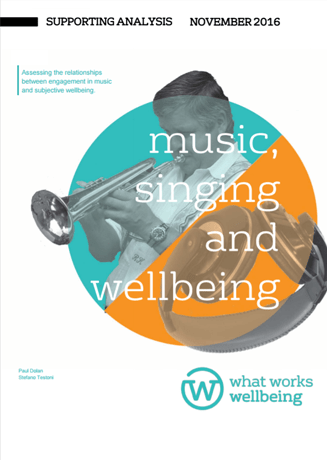Music, Singing and Wellbeing in adults with diagnosed conditions or dementia summary insights
Downloads

Intro
What music and singing interventions work to improve
wellbeing of adults living with diagnosed conditions or
dementia? This briefing looks at all the available evidence to support better policy.
There is a lot of existing evidence looking at the impact of music and singing where the focus is on clinical outcomes such as pain management, coping with hospitalisation, coping with symptoms and managing symptoms of dementia. This new evidence focuses on wellbeing for those living with diagnosed conditions or dementia.
Specifically, it focuses on self-reported measures of quality of life; life satisfaction; and anxiety or
depression.
What are the key findings?
Music and singing activities can enhance and maintain subjective wellbeing in adults with diagnosed conditions.
Participants report a wide range of wellbeing benefits from singing including relaxation, reduction in anxiety, spiritual uplifting and improvements in mood, emotional wellbeing, confidence, enjoyment and a ‘feel good factor’.
Participation in a music project can raise participants’ awareness of the significance of music in their life. This in turn can have a positive effect on awareness of health and quality of life and can encourage behaviour change.
Below is the evidence of impact on different populations that participated in group singing, listening to music and structured music interventions. Further evidence, with standardised reporting, could help us understand the characteristics of the most successful projects.
Where you see the following symbols it indicates:
-
qualitative
-
quantitative
-
strongWe can be confident that the evidence can be used to inform decisions.
-
promisingWe have moderate confidence. Decision makers may wish to incorporate further information to inform decisions.
-
initialWe have low confidence. Decision makers may wish to incorporate further information to inform decisions.
There is strong evidence that brief music therapy is an effective intervention to support
wellbeing of palliative care patients in hospital settings.
There is emerging evidence that music therapy can contribute to improved spiritual wellbeing in hospice patients.
There is strong evidence that targeted, culturally relevant music interventions can decrease depression in nursing students
in a college environment.
There is emerging evidence that music therapy can alleviate anxiety in undergraduate students.
There is promising evidence that targeted, culturally relevant music and singing interventions can enhance mental wellbeing and decrease depression in older
people with chronic conditions in residential and community settings.
There is initial evidence that:
- participation in individual personalised music listening sessions can reduce anxiety
and/or depression in nursing home residents with dementia and that listening to music may enhance overall wellbeing for adults with dementia. - music therapy has a positive effect on mood in post-stroke patients and may be beneficial for mood improvement with stroke.
- participation in extended (12 months) community singing programmes can improve quality of life and social and emotional wellbeing in adults living with chronic conditions.
- participation in group drumming can support participants dealing with symptoms of PTSD.
- singing classes are associated with improvements in wellbeing in patients with COPD.
How can we turn this evidence into action?
Keep doing what you do well
There is promising evidence to support the work of community groups, local authorities, care homes and others who are already using culturally relevant, targeted
music and singing interventions to enhance wellbeing and decrease depression.
Contribute to further understanding
How large are these benefits compared to other activities? How much does this cost compared to
others?
We need to know more, to be able to fully support local authorities, funders and organisations with the decisions of where best to allocate their money and time.
Developing the evidence:
Funding partners can support initiatives with initial and
promising evidence and providing support to evaluate their impacts will be essential to develop the evidence base.
Initial evidence on the benefits of listening to music
for those with dementia, or, for example, the benefits of drumming for PTSD, singing classes for patients with COPD – can all be strengthened.
We can better understand what works, in what contexts, for whom, with standardised reporting of impacts as well as characteristics and challenges.
What can you do next?
Community organisations and charities running music and singing programmes need standardised evaluations to help to identify and replicate the characteristics of successful projects.
Do you want to be a pioneer? Do you have an evaluation which we should know about? Email it to evidence@ whatworkswellbeing.org
Explore more
This briefing is part of a suite of publications looking at the impacts of music and singing interventions on different populations.
Downloads
You may also wish to read the blog article on this document.
Downloads
You may also wish to read the blog article on this document.
![]()
[gravityform id=1 title=true description=true ajax=true tabindex=49]






